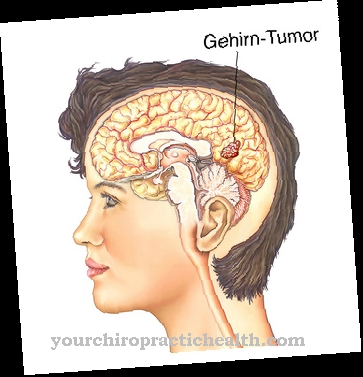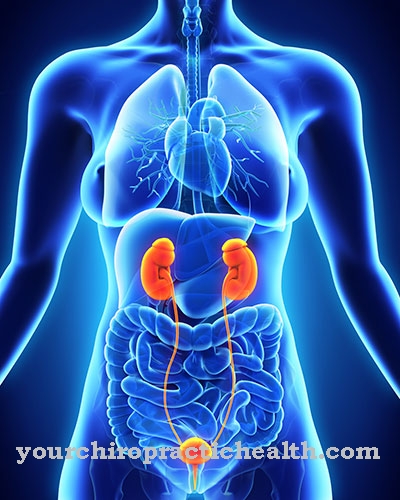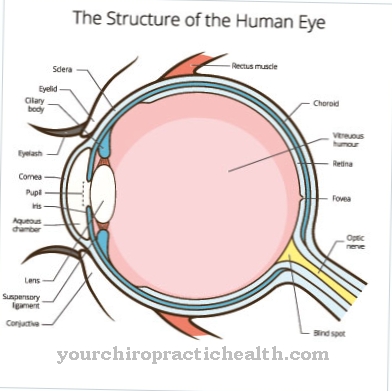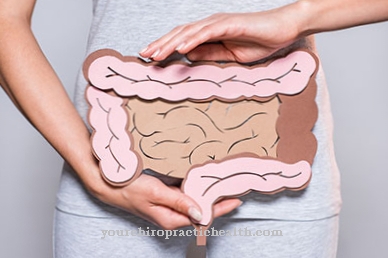Attention deficit can occur in the context of mental and neurological diseases. Attention deficit disorder is one of the central characteristics of attention deficit disorder with or without hyperactivity (ADHD or ADD).
What are attention disorders?

© soupstock - stock.adobe.com
Attention is a cognitive performance that consists of different parts. With an attention disorder at least one of these functions is disturbed. Vigilance or alertness is also known as sustained attention.
It is not aimed at a specific task, but describes a basic state of the nervous system. In the case of a vigilance disorder, the person concerned cannot maintain his attention for a long time. Vigilance also plays an important role in connection with other aspects of attention.
Alertness or attention activation is used to put the psyche into a general "alarm state" in which the person can react quickly to relevant stimuli. Executive attention is another facet. It is consciously controlled and is used, for example, to specifically fade out unimportant stimuli or to direct attention to a specific object.
In everyday life, many people understand an attention disorder to mean that the person concerned is easily distracted. This is a disorder of selective attention. With the help of selective attention, a person selects relevant stimuli and reacts to them appropriately.
If, on the other hand, the divided attention is disturbed, the person concerned can only work on one task at a time. If he is confronted with at least two tasks, however, his performance drops significantly.
causes
Attention disorders can be caused by neurological diseases. They may occur after a stroke or are triggered by a brain tumor. Attention disorders can also arise in the event of a traumatic brain injury, inflammation of the central nervous system or dementia syndrome.
Many mental illnesses are accompanied by attention and concentration disorders. This applies to depression, schizophrenia, and autism, for example.
Various causes are discussed for attention deficit hyperactivity disorder (ADHD). Genetic factors likely influence the development of ADHD. Researchers also found structural differences in the brain that differentiate people with ADHD from other people. There are also differences in measurements of brain activity.
Psychological and social factors also play a role in the development of ADHD. However, it is controversial among experts whether the family and social environment actually cause ADHD or whether they merely aggravate the symptoms. Boys are more likely to have ADHD than girls. The sex difference is greater in the predominantly hyperactive and impulsive types of ADHD.
You can find your medication here
➔ Medicines to calm down and strengthen nervesSymptoms, ailments & signs
Attention disorders typically affect many cognitive functions. The patient often has the feeling that they can no longer concentrate. He may seem "bumbling" and distracted. Tasks that require attention are troublesome and perform worse than expected. This also applies if the intelligence is unchanged. In the case of a stroke in particular, however, other partial functions of intelligence can also be impaired.
A vigilance disorder manifests itself in the fact that the patient can maintain his alertness for less than half an hour. With other attention deficit disorders, people may have trouble following a conversation or driving a car.
ADHD is characterized by three key symptoms: attention deficit, impulsivity, and hyperactivity. For attention deficit hyperactivity disorder to be diagnosed, symptoms must have persisted for more than six months. In addition, they must not be due to any other cause. The symptoms of ADHD appear before the age of seven. If the symptoms only start when you start school and there were no signs of ADHD beforehand, other explanations than the syndrome must be considered.
In ADHD, the cardinal symptoms are not only qualitative, but also quantitative. Every child is at times inattentive and hyperactive. Since children have yet to learn to control themselves, they are more impulsive than adults. In ADHD, however, these signs are much more pronounced than in other children who are the same age and have the same level of mental development.
Complications
Attention disorders affect all areas of life. The ability to work can also suffer. People with attention deficit disorders are often underestimated or labeled as "stupid" by other people. As a result, various psychological complications can develop: Depression is a common reaction to continuous degradation. The attention deficit can also make the patient feel inferior. He may even blame himself for his poor performance. Anxiety is another possible complication.
If the attention deficit is due to a neurological disease or an event such as a stroke, other cognitive functions may also be affected. Then speech disorders, memory problems, perception disorders and orientation disorders are possible.
ADHD can be associated with other mental illnesses and problems. Oppositional behavior disorder or aggressive dissocial behavior disorder are common in children. One-third to one-half of children with ADHD will have such a behavior disorder. Learning disorders are somewhat less common.
Children with ADHD are more likely than other children to be literate or arithmetic. They often suffer from tic disorders such as Tourette's syndrome. Other possible complications are anxiety disorders and depression. In some cases, an eating disorder can develop as a complication.
Some teens and adults with ADHD use drugs and alcohol as self-medication. This can lead to substance dependence. Harmful use of drugs and alcohol is also above average in this group of people. Possible complications are poisoning, delirium or road accidents.
When should you go to the doctor?
Mild attention deficits are not always a reason to see a doctor. They can also occur as a result of a cold or some other mild infection. In addition, attention fluctuates throughout the day, which is perfectly normal.
However, it is advisable to see a doctor if alertness deteriorates and no cause is apparent. If symptoms suggestive of a stroke occur, a doctor should be seen immediately or an emergency doctor should be called.
If the complaints are unclear, a general practitioner or pediatrician is often the first point of contact. Depending on the cause, further treatment can be taken over by a neurologist, psychiatrist, psychotherapist or child and youth therapist. The diagnosis of ADHD should always be carried out by a specialist.
Some patients mainly suffer from psychological complaints, while the attention disorder makes up only a small proportion. This can apply to depression, for example. In this case, those affected can also contact a psychotherapist directly. A transfer is not necessary in Germany.
Doctors & therapists in your area
diagnosis
Attention can be measured with neurocognitive tests. Such tests are usually instructed and evaluated by a psychologist, psychotherapist or psychiatrist. Different aspects of attention should be recorded. The everyday complaints that the patient describes are also included in the diagnosis.
A well-known test that measures concentration is the Brickenkamp "d2". The patient is given a worksheet on which rows of letters with and without lines can be seen. Within a given time he crosses all "d" that have two dashes. The worksheet also contains other letters such as "b" and letters with varying numbers of strokes.
An EEG, CT, or MRI is often done to make a neurological diagnosis or to rule out such a cause. These methods show the brain activity or make the structure of the brain visible. Doctors can use this to assess whether there are any abnormalities. A brain tumor or advanced dementia syndrome can usually be seen in these images.
The diagnosis of ADHD is very complex. Different perspectives should be considered for children and adolescents, e.g. B. from parents and teachers, if possible from different teachers. The child's behavior is recorded in standardized questionnaires. An example of this is the "questionnaire on strengths and weaknesses" by Klasen, Woerner, Rothenberger and Goodmann.
For adults there is the "ADHD Screening for Adults" by Schmidt and Petermann or the "Adult Self-Report Scale" of the World Health Organization. In this questionnaire, the person concerned specifies which of the symptoms he / she recognizes in himself. The "ADHD screening for adults" is only the beginning of the diagnosis. A screening basically only covers rough features. This enables a doctor or psychologist to decide whether a detailed ADHD diagnosis is worthwhile or whether the cause of the attention disorder is probably something else.
Necessary differential diagnoses of ADHD include behavioral disorders in childhood, impulse control disorders, tic disorders, epilepsy, and other neurological disorders. In adolescents and adults, it is also necessary to differentiate from the emotionally unstable personality disorder.
Treatment & Therapy
Treatment for attention disorder depends on the underlying cause. A stroke must be treated promptly to increase the chance of survival and minimize the consequences. This is often followed by neurological rehabilitation.
Surgery is an option after a traumatic brain injury or a brain tumor. In the case of a brain tumor, radiation and / or chemotherapy can also be used. The treatment is always individually tailored to the patient.
Neurological and psychiatric diseases may be treated with medication. A well-known active ingredient that is used in ADHD is methylphenidate. However, AHSD and ADD should also be treated psychotherapeutically. In the case of children in particular, social therapeutic or (professional) educational concepts can also be used. It is important that the parents are also involved in the treatment. Various attempts at neurofeedback have also been successful in ADHD.
Co-therapies such as occupational therapy can be useful for attention disorders, as they train attention and contribute to comprehensive treatment. Occupational therapy is part of neurological rehabilitation after a stroke and can also be considered in the case of dementia or ADHD.
Outlook & forecast
The prognosis for attention deficit disorders is particularly favorable if the cause can be treated. In other cases the symptoms can be alleviated. There are big differences between different diseases, but also between individuals.
Scientific studies show the best effects for ADHD therapy in drug treatment and cognitive behavioral therapy. Both can also be used together. In most cases, symptoms decrease in adulthood. Adults with ADHD can have rather unspecific symptoms - therefore it is controversial whether these cases are still ADHD in the sense of the disease.
You can find your medication here
➔ Medicines to calm down and strengthen nervesprevention
In the case of attention disorders that are neurologically caused, only indirect prevention is possible. Living a healthy lifestyle helps reduce the risk of stroke. Obese people should reduce their weight to normal levels. High cholesterol and smoking increase the risk of stroke and should therefore be avoided. Sufficient physical activity can also help prevent a stroke.
Lifestyle factors could also play a role in the development of brain tumors and other cancers. For example, various studies point to the importance of a healthy diet with lots of vegetables and fruits.
Targeted ADHD prevention is not possible since psychosocial factors are probably not the cause of the disease. They just seem to make the symptoms worse. However, good parenting behavior on the part of the parents may reduce the intensity of ADHD.
You can do that yourself
Ease of distraction is a fundamental problem with many attention disorders. It can be taken into account when designing the environment. Workspaces such as the office, home office or school seat should be free from distracting stimuli. A tidy desk and a low noise level also help people without attention disorders to concentrate better on their tasks.
In many cases, attention can be trained by repeatedly challenging themselves and being challenged by those around them. However, this is not always possible. In any case, excessive demands should be avoided as this leads to frustration.
Attention can be trained in many everyday activities:
- reading (calms, organizes and structures thoughts and nerves)
- see a film and then summarize it
- have a longer conversation (also trains social skills, reasoning skills and logical thinking)
- Solve puzzles (e.g. Sudoku or crossword puzzles)
- putting together a puzzle
- Handicrafts
- write a letter
- … and much more
It often helps people with ADHD to give themselves more space. Some do a lot of sport in order to live out the increased urge to move, while others meditate consciously or practice deep relaxation. Both together are also possible.
However, the measures are not a substitute for medical or psychotherapeutic treatment. Neurological diseases such as tumors, strokes or dementia, in particular, require medical treatment.





.jpg)





















